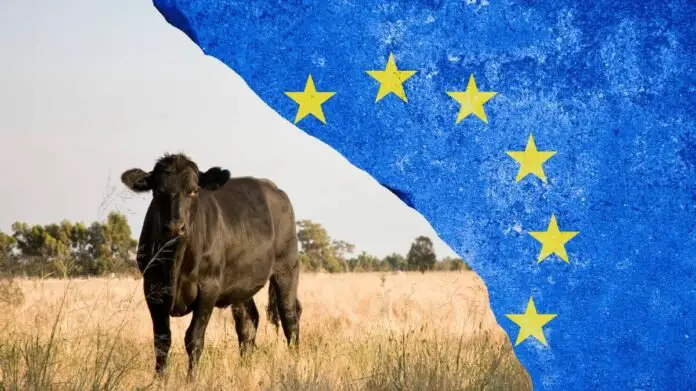Farmers from across the EU marched on Brussels this afternoon. Gathering outside the European Parliament, they tramped to the Berlaymont, the European Commission’s headquarters, to protest cuts to farm subsidies.
Organised by COPA-COGECA, which represents 22m European farmers, the demo was a direct challenge to Ursula von der Leyen, the commission’s president. The unions handed over a petition signed by 6,335 groups, plus a pair of symbolic boots—their way of saying the EU is stepping on their livelihoods.
The row centres on plans to shrink the Common Agricultural Policy (CAP). Today’s budget announcement would fold CAP into a single pot for each country and slash subsidies by 20-25%—a real-term cut of €80bn to €100bn. It would also cap payments to any farm at €100,000. Cash-strapped governments could even raid the fund to pay for defence or industrial policy.
This is not the first outcry. Farmers have been venting for years. In May, Polish farmers rallied in Szczecin, demanding their government ditch tough new rules and reject the EU’s green mandates. It was a sequel to 2024, when Rural Solidarity, Poland’s biggest farm union, blocked roads to protest the European Green Deal and cheap Ukrainian grain imports.
The biggest revolts began in the Netherlands in 2019. The country’s top administrative court ruled that the Netherlands faced a “nitrogen crisis”, blaming the government for missing EU emission targets.
To fix it, ministers planned to buy out and shut the dirtiest farms, culling half the nation’s livestock. Farmers fought back. That October, thousands of tractors gridlocked motorways to The Hague, causing the worst jams in Dutch history.
Protests dragged on: tractors blockaded supermarkets and ferry ports; manure and burning hay bales clogged highways. Yet the government stood firm. By 2022, it said a third of farms must close to hit EU targets. A year later, it named 3,000 “peak polluter” farms for forced closure.
Ireland saw similar unrest in 2023. The agriculture minister admitted that to meet the EU’s Green Deal goals—cutting greenhouse gases by 55% by 2030—farmers might have to cull 200,000 cows. Months later, the government backtracked, calling it a “hypothetical” idea.
These spats are part of a broader EU push. Its 2020 Farm to Fork strategy ordered member states to set aside 10% of farmland for nature by 2030, convert a quarter of holdings to organic, cut fertiliser use by 20% and halve chemical pesticides (though the last was later dropped).
Farming matters. The Netherlands is the world’s second-biggest food exporter. In Ireland, food, drink and horticulture make up nearly 10% of goods exports—more than any other sector. Polish farms employ 1.2m people, 3% of output. Across the EU, 9m people—4% of the workforce—earn their keep from farming.
Yet Brussels’ rules risk wrecking this. The EU already imports €171.8bn of food a year, up 8% on 2023. Driving more farmers out of business would mean relying on longer, shakier supply chains—vulnerable to droughts or wars. As one protester’s sign put it: “No farmers, no food.”
Why the squeeze? Green zeal plays a part. The latest budget cuts may also reflect how out of touch urban elites are. Many seem to think food comes from supermarkets, not fields.
Today’s protest in Brussels may jolt them. If not, empty shelves might. The EU needs to listen. Europe’s food security depends on it.

